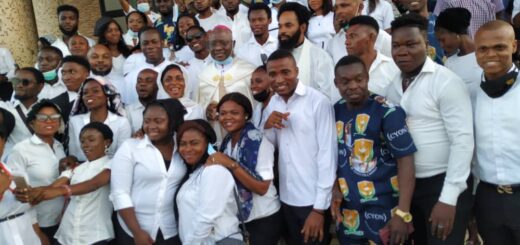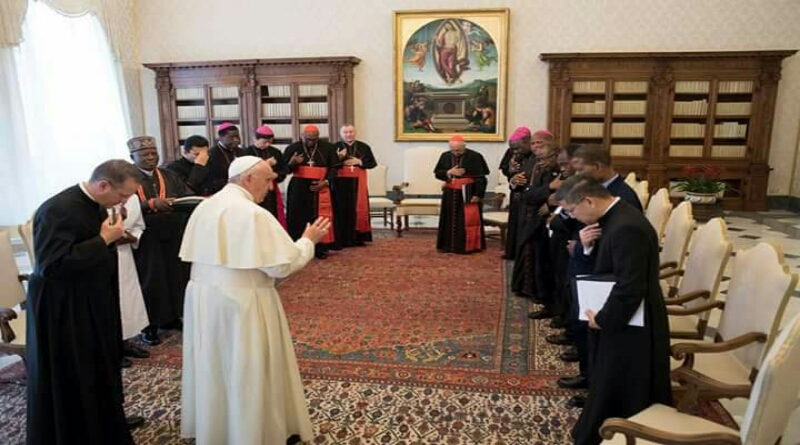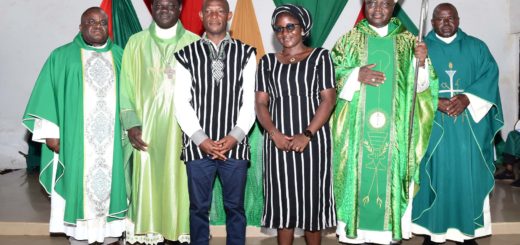SOLEMNITY OF THE ASSUMPTION OF THE BLESSED VIRGIN MARY
by ARCH BISHOP · August 15, 2021
SOLEMNITY OF THE ASSUMPTION OF THE BLESSED VIRGIN MARY, AUGUST 15, 2021, CHURCH OF ANNUNCIATION, ARAB RAOD, KUBWA, ABUJA, HOMILY BY ARCHBISHOP I. A. KAIGAMA
READINGS: Rev. 11: 19, 12:1-6, 10; Ps. 44 (45): 10-12, 16; 1 Cor. 15: 20-26; Lk. 1:39-56
May God’s grace and peace be upon you the parish priest, Fr. Joseph Olisah, and your beloved parishioners of the Church of Annunciation, Arab Road, Kubwa, as we celebrate the solemnity of the Assumption of the Blessed Virgin Mary into heaven (cf. Catechism of the Catholic Church, no. 966).
Pope Pius XII in the Apostolic Constitution, Munificentissimus Deus, proclaimed in 1950: “We pronounce, declare and define it to be a divinely revealed dogma: that the Immaculate Mother of God, the ever Virgin Mary, having completed the course of her earthly life, was assumed body and soul into heavenly glory….”
At the foot of the Cross, Jesus gave us Mary as our mother (cf. Jn. 19:26-27), and as a mother, we strongly believe that she presents all our spiritual and material needs to her Son Jesus Christ.
Mary’s words, “The Almighty has done great things for me and holy is his name” (cf. Lk. 1:49) sum up her life as a special vessel in the hand of God. First, she was full of grace from the very moment of her conception in the womb of Anne, her mother. She was free from Original Sin, and by this same privilege, she became the mother of God –Theotokos, but remained a virgin before and after the birth of Jesus, which is why the Church speaks of her as the ever Blessed Virgin Mary.
Our first reading from Revelation refers to the woman clothed with the sun, the moon under her feet, and on her head a crown of twelve stars. God protected her and her offspring from the dragon. Right from the patristic era, Mary has been associated with the Ark of the Covenant and that woman who “brought forth a son to rule all the nations” (Rev. 12:5).
In the second reading, St. Paul recalls the resurrection of Christ and its importance for all believers. Our hope lies in Christ’s promise that “I go and prepare a place for you; I will come back and take you to be with me that you also may be where I am” (Jn. 14:3).
Mary’s assumption into heaven gives hope to us that if we live a life of fidelity to God’s commands; endure sufferings, persevere in faith, and keep hope alive amidst threats and dangers, we will join her in God’s glorious Kingdom.
Mary’s greatness lay in the fact that she was humble before God and surrendered herself totally to God: “Let it be done to me according to your word” (Lk. 1:38). Surrendering herself to God did not free her from trials. Catholics speak about the seven dolors (sorrows) of Mary: Simeon’s prophecy, the flight of the Holy family into Egypt, the three days loss of the child Jesus in the Temple, meeting Jesus on the way to Calvary, the crucifixion, taking Jesus down from the cross and His burial.
We Catholics honour and venerate Mary in a variety of ways. Muslims too honour her as the “mother of Isa (Jesus) and she holds a singularly exalted place in Islam as the only woman named in the Quran, which refers to her seventy times and explicitly identifies her as the greatest of all women” (cf. Mary in Islam, in Wikipedia). Apart from several mention of her in other chapters of the Quran, the 19th Surah titled Maryam, is named after her. Catholics and Muslims could draw many lessons from the life and conduct of such a woman of deep faith to motivate us to contribute selflessly to national development, harmony and peaceful coexistence.
Mary’s life was lived fully, humbly and unconditionally with a capital ‘YES’ to the will of God. Mary expressed gratitude to God in her song of praise (Magnificat), teaching us to be always grateful and contented even with the little we have, and to learn to share with others, and not to struggle for vain riches, or to unjustly dominate others in the name of religious zeal.
Mary was very sensitive to the needs of others as demonstrated by her visit to her six-month pregnant cousin, Elizabeth. Elizabeth, once called barren, endured a lot of shame and contempt, like women or families today who suffer insults because they have no children.
The dragon that attempted to eat up the child to be born (cf. Rev. 12:4) refers to the devil who even today is hyperactively labouring to consume our moral values, and deprive us of human feelings by proposing a God-less culture in many people and nations.
If we can ask pastors and imams or holy men and women to pray for us and our needs, we have even more reason to ask Mary, so highly favoured by God to intercede for us as she did on behalf of the wedding couple in Cana (cf. Jn. 2). We need urgent divine help for our nation, our families, and especially, our young people suffering employment deprivation and losing confidence in self-seeking political leaders to give them what it takes to survive well in their fatherland. God’s intervention is urgently needed because of prevailing corruption, bloodshed and violence. Also, apart from so many youths having no jobs, some of our children are in the wicked hands of terrorists and bandits in the bush subjected to emotional and social deprivation. The poor continue to get poorer with increasing inability to afford the basic necessities of life due to price increases and sluggish payment of salaries, pensions, and very poor social welfare scheme.
Our prayer is for all Nigerians to be supported by God’s grace to live in humility, purity and sincerity like Mary, so that even after this life of “suffering and smiling”, we will see God in the company of the Saints, the Angels and our Blessed Mother.




